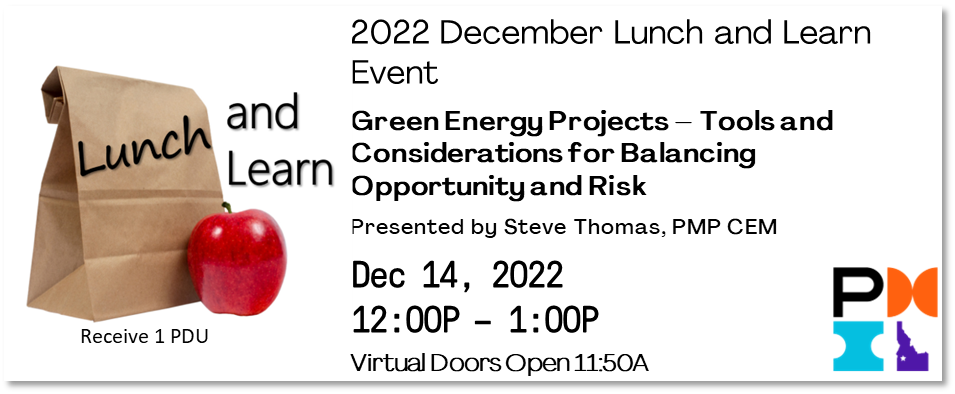
Green Energy Projects – Tools and Considerations for Balancing Opportunity and Risk
Presented by Steve Thomas, PMP CEM
Renewables / Energy Efficiency Segment Manager
Summary:
Organizations embrace the concepts around energy transition, greening, decarbonization, ESG and renewable energy. Momentum is building to transform the grid and energy production in the built environment. Translating concepts, funding, and ideas into concrete and practical projects requires clearly defined goals, funding mechanisms, and accountability to bridge the economic and performance gaps. Many ambitious projects with important sustainability objectives result in less than optimal outcomes because these gaps are not adequately recognized or mitigated. Resources and approaches deployed to preserve these attributes and ensure performance are crucial to meeting green energy objectives.
Key Takeaways
Some aspects of Green Energy Projects we will explore.
The necessity of Hybrid energy systems.
Hybrid energy solutions enable moving the needle towards integrating more green energy into the existing infrastructure. Merging diverse resources and technology enable greater adoption of emission-less generation and needs to happen at the macro and micro level.
Green Energy requirements and expectations need to be defined and championed.
Modeling and design tools help explore performance expectations. Incentives, financing, and funding innovations take the edge off some economic challenges, but 1:1 comparisons of traditional and green energy are not adequate yardsticks for project evaluation. Interactions with systems and networks allow for net attributions and performance benefits but in many cases dilute the economic case for investments. Non-economic objectives and benefits must be championed, funded, and protected.
Accountability and verification are key components of effective energy projects.
Forgoing commissioning, monitoring and evaluation can lead to wasted capital and underperforming resources, in some cases leading to the need to supplement with other technologies what could have been an effective green energy project. Ensuring that your project performs as expected and monitored for its life is crucial to realizing the benefits of green energy investments.
Speaker Bios

Steve Thomas, PMP, CEM
Renewables / Energy Efficiency Segment Manager
Steve Thomas is a segment manager in the Power Systems Division at Wheeler CAT, Steve develops business opportunities around renewable energy and emerging technology. He loves helping customers and partners navigate an increasingly complex energy landscape. While fantastic evolutions in technology and funding are moving the industry forward, we still combine many different solutions to meet custom needs. Steve works to join the best finance, incentives, technology, and equipment into innovative hybrid energy solutions.
Steve holds current Project Management Professional (PMP) and Certified Energy Manager (CEM) credentials. He was previously certified as a HUD HOME Program Specialist and Building Performance Institute Building Analyst and Envelope Professional and completed AEE Renewable Energy Professional (REP) and RESNET HERs energy auditor training. He holds a BA from Southern Virginia University and Master of Urban and Regional Planning from Virginia Commonwealth University.
He lives in Cedar Hills, Utah with his wife, two sons, and a daughter where he volunteers on the planning commission. He enjoys fly fishing.
Review the presentation slide deck.
View the presentation video. PDU reporting instructions are included in the video.
You can claim 1.0 PDU for this Lunch and Learn. Lunch and Learn topics align with any/all of the PMI Talent Triangle® components.
